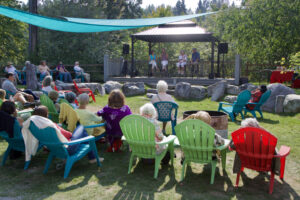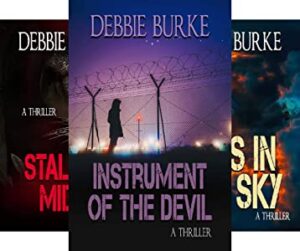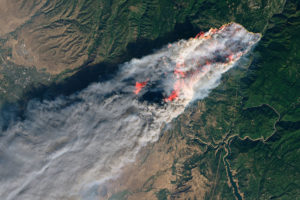By Debbie Burke

Art at Tao
In 2018, I was privileged to crash a party in Manhattan hosted by Blackstone Publishing to celebrate their new book launches during an extraordinarily successful year. My pal Susan Purvis was one of Blackstone’s debut authors with her memoir Go Find, and I was graciously included as her guest.
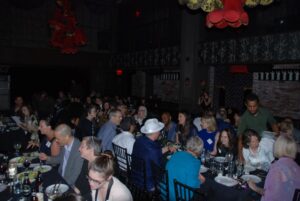
The event took place at the trendy Tao Downtown Nightclub with an open bar and sit-down dinner.
The crowd consisted of publishing industry luminaries, agents, editors, and celebrity authors including the delightful M.C. Beaton.
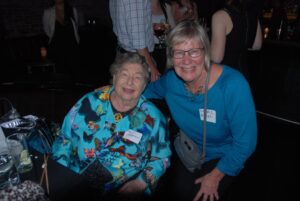
M.C. Beaton and me
A long stairway led from street level to the nightclub. After a couple of drinks, you could almost see the ghosts of Truman Capote, Maxwell Perkins, and Jacqueline Onassis descending the stairs from a bygone era when publishing was a glamorous business.
It was fun to have a glimpse inside that rarified world but, in reality, most publishers, let alone authors, can’t afford lavish promotion. As an indie author, my budget is on such a short shoestring that a mouse couldn’t hang itself.
Nevertheless, I wanted to host a celebration for my new thriller, Deep Fake Double Down.
The good news is a successful book party can be done without spending a lot of money. It takes DIY work, a little ingenuity, and lots of help from good friends. Here are six tips I learned along the way.
-
Find an inviting venue that’s low- or no-cost.
Authors and bookstores go together like peanut butter and jelly. The business carries our books. Our events draw new customers. We support each other. Win-win.
Stephanie Pius recently bought The BookShelf in Kalispell. She is eager to build her customer base and offered her shop as a free venue. We decided on a Friday afternoon, 4 to 6 p.m. when people were getting off work and downtown foot traffic was good.
Stephanie dove right in to help, running ads about the party on the store’s social media accounts. The corner location has windows on two streets and she put up posters in all windows. On the sidewalk in front, a sandwich board invited passersby to meet a “local author.”
She provided tables and folding chairs, and even rearranged heavy, book-laden shelves to make room for seating.
Financial agreement: I delivered books. Stephanie tracked inventory and handled sales, including credit cards. She received 40% of the list price, with 60% to me, which is fairly standard for indie publication.
With a traditional publisher, terms may be different and the bookstore generally orders books from the publisher.
-
Promotion.
I printed invitations and handed them out at Zumba classes, at meetings, to the clerk at the post office who helps me mail books.
Additionally, I sent invitations by email. On your guest list, include friends, family, neighbors, coworkers, book clubs, writing colleagues, local media personalities, etc.
Publicize on social media and ask friends to share on their accounts.
Print color posters advertising the event and post them at libraries, coffee houses, and of course at the bookstore.
Send press releases to local online events calendars and newspapers.
Seek out unconventional (and free) outlets for publicity. Montana’s electric co-op magazine features a community events calendar and is sent to customers throughout the state. Surprisingly it has drawn out-of-town attendees to my events.
None of these promotions cost money except for paper and ink.
Here’s where years of connections, networking, and good friends in the writing community paid off.
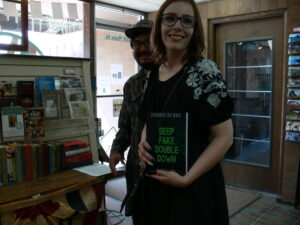
Renee and Regi drove almost 200 miles from Helena.
My friends rallied round me with support that warmed my heart. They pitched in with planning help, spread the word on social media, helped set up, tear down, clean up, etc., etc.
By fortunate coincidence, a week before the party, a local glossy magazine, Flathead Living, featured a story about the Authors of the Flathead that mentioned me as one of the founders. That was great exposure to readers beyond my immediate sphere.
In another stroke of good luck, I ran into the editor/publisher of Montana Senior News in the check-out line at Costco and invited him. He showed up at the party, had a great time, bought several books, and promised to publish a review of Deep Fake Double Down.
Truthfully, I think it was the butterscotch chip cookies that got to him. (See recipe below.)
Cold promotion is hard for introverted writers. But inviting people to a party shifts the focus from “buy my book” to “come celebrate with me.”
-
Refreshments! Nothing attracts people like free food and drink.
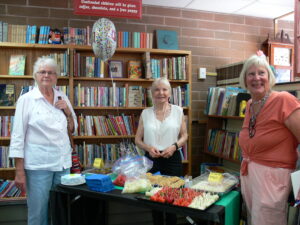
Critique partners Marie Martin and Betty Kuffel help me set out food.
Wine and cheese are always popular. If feasible, feature a food or beverage from your book, for instance, tea for a cozy mystery, or coffee and donuts for a police procedural. If the setting is a different country, ethnic specialties are fun.
For the hot July evening, I bought bottled water and flavored fizzy drinks and brought an ice-filled cooler. I cut up watermelon, honeydew, and pineapple for fruit platters. (Note: For health/sanitary considerations, provide toothpicks to avoid hands touching food. Remember hand sanitizer, too.)
I baked three batches of cookies. Here’s the recipe the editor liked:
To-Die-For Butterscotch Chip Cookies – makes 3-4 dozen
Stir together 2 ¼ cups flour, 1 teas. baking soda, 1 teas. salt. Set aside.
Mix together 1 cup soft butter, ¾ cup granulated sugar, ¾ cup packed brown sugar, 1 ½ teas. vanilla. Beat until creamy. Beat in two eggs. Add flour mixture and mix well. Stir in 1 to 1 1/2 cups butterscotch chips. Drop by teaspoonfuls on greased cookie sheets. Bake at 375 degrees for 10-12 minutes. Cool on rack.
Tying into my book title, I also baked “Deep Fake Cakes.” I decorated two sheet cakes with tube icing and added a sign that read, “Calories are an illusion!”
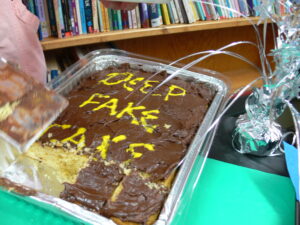
Who got into the cake before I took a photo???
On your shopping list, include paper plates, napkins, cups, disposable cake pans and platters, utensils, etc. They are inexpensive at Family Dollar, Dollar Tree, or similar stores.
4, Freebies! Readers love giveaways.
My novella Crowded Hearts had initially only been available in ebook because it was less than 100 pages. But a significant percentage of my readers prefer physical books so I’d ordered a small stock of POD (print on demand), cost under $5. When book clubs bought multiple copies, I threw in the novella as a bonus. That went over well so I did the same for the party. Anyone who bought two or more books received a free novella.
Quite a few attendees happily took home an extra freebie.
-
Prizes! People love a chance to win.
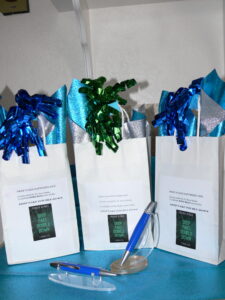
Prize gift packages
Here’s where I really lucked out. Thanks to the generosity of our own Steve Hooley, the prizes were beautiful custom wood pens. Steve handcrafts the pens using salvaged lumber from historic buildings that were torn down or undergoing renovation. The wood dates back to the 18th and 19th century. Here’s the link to the “Legacy Pens” on his website.
Steve even came up with a clever tie-in to Deep Fake Double Down: in the book, a secret Yogo sapphire mine is a treasure worth killing for. Steve designed a limited edition “Deep Fake Sapphire” pen, finished in the same luminous blue as Yogo sapphires.
At the party, I explained the history of the pens, which fascinated people. They eagerly filled out entry forms, signing up for my newsletter for a chance to win a unique pen. That resulted in a number of new subscribers.
Oh yes, I kept busy signing books with my own Deep Fake Sapphire pen.
I can’t thank Steve enough.
Other possible prize options: a signed book, a gift certificate from the store that hosts the party, a package of gourmet coffee, a bottle of wine, a sampler of specialty candy.
-
Entertainment! Make the party interesting as well as fun.
Engage guests with a short talk about why you wrote the book, along with Q&A. Readers enjoy peeking behind the curtain into the writing process. Relate an interesting anecdote or share a surprise you encountered while doing research. Mention unexpected problems that popped up. Raise curiosity to entice them to buy the book.
Readings can be popular…as long as they’re brief. I confess I’ve slipped out of a few book signings where the author droned on far too long.
But no one sneaked out of this party during the reading of Deep Fake Double Down, thanks to the stellar performance of another good friend, stage actor and audiobook narrator Eve Passeltiner.
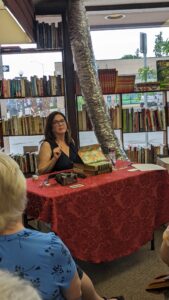
Award-winning audiobook narrator Eve Passeltiner emphasizes a dramatic moment.
Eve is recording my series and graciously agreed to read a chapter during the party. Except read isn’t the right word. She brought the characters to vivid, dramatic life, blowing away the audience, as well as the author!
~~~
How did the party go?
Turnout: During the two hours, about 40 people came into The BookShelf, including curious passersby who stopped to see what was going on.
Stephanie’s cut from sales made the evening worthwhile for her, plus she welcomed new customers and became better acquainted with existing ones.
Cost: $75 for food, beverages, decorations, gift packaging—well within my shoestring budget.
Time expended: approx. 30 hours in promotion and preparation.
Results: 25+ newsletter signups; 27 books sold that evening plus five novellas as freebies to purchasers of multiple books.
Verdict: The party was a success that guests enjoyed. A local small business reached new customers. Book sales more than covered costs and are continuing a nice steady climb.
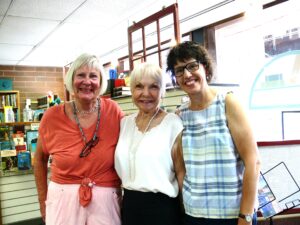
Me with critique buddies, Betty Kuffel and Kathy Dunnehoff
And I had a terrific time, surrounded by friends and supporters who are dear to me.
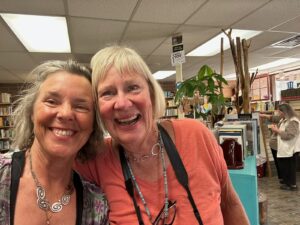
Susan Purvis and me
All accomplished on a shoestring budget.
~~~
TKZers: Have you attended book signings/parties? What made the event special? If you were bored and left early, what made it a dud?
Any ideas for future parties?
~~~
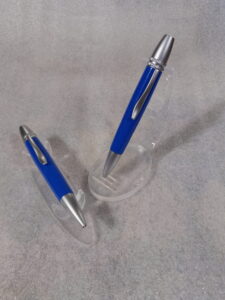
Deep Fake Sapphire Pens, handcrafted by Steve Hooley
Here’s another chance to win a limited edition Deep Fake Sapphire pen. Join Debbie Burke’s reading group at this link and your name will be entered in a drawing for the pen (postage costs limit mailing to US addresses only, please).


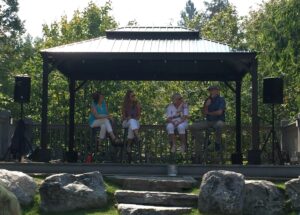
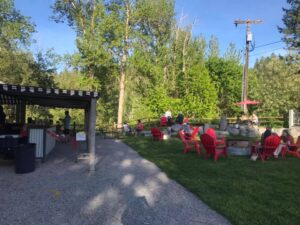
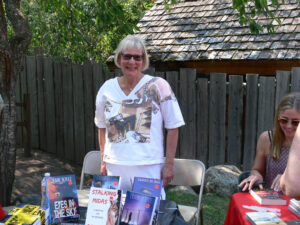 Beforehand, set up your own book table.
Beforehand, set up your own book table.